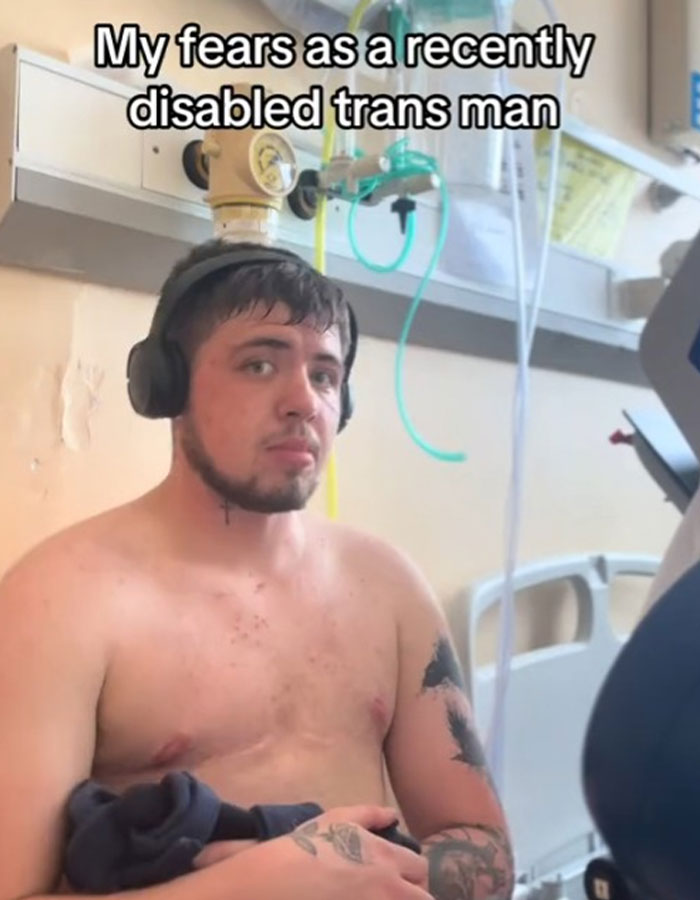While most people in their early twenties grapple with academic stress, ponder their next party outfit, or figure out how to care for a plant, Solice Lane faced a completely different reality—one where he has to learn to walk and talk again.
Solice was a typical young adult in the midst of his third year at the University of South Wales, UK, studying film and specializing in video editing, when a funny physiological feeling flipped his life upside down.
“It took me by surprise,” the 23-year-old recalled. “My arm felt heavy. I didn’t take much notice of it.”
It wasn’t long before the student from a small Welsh town called Llanelli noticed that his limb became more and more numb, prompting him to call 111, the UK’s emergency health line.
At first, a female health worker on the phone didn’t worry, but as panic rapidly grew, Solice’s mother took matters into her own hands, describing the symptoms of a stroke to the emergency responders.
“I urgently made my way to A&E (accident and emergency),” Solice remembered. “The growing concern on the doctor’s faces made me aware of the severity.”
The film enthusiast was under the impression that his medical ordeal would be a “quick fix” and that he would promptly recover and get on with his life, “but [he] had no idea of what was to come.”
Solice Lane, a 23-year-old transgender man from Llanelli, UK, faced a life-altering diagnosis of Baló concentric sclerosis (BCS)

Solice thought that his slightly slurred speech and his weak limbs, which he could move again, were caused by the effects of the drugs he had been administered for the supposed stroke.
However, doctors alerted the youngster that an inflammation with “a sort of rash” was visible on his brain.
“I didn’t realize I would lose complete mobility,” Solice told Bored Panda in an email. “From then on, it went downhill.”
In the spring, Solice was devastatingly diagnosed with Baló concentric sclerosis (BCS), a condition that may be a variant of multiple sclerosis (MS).
BCS is a rare central nervous system inflammatory disease considered a subtype of multiple sclerosis (MS), Radiopaedia notes. As with other forms of multiple sclerosis, patients undergo acute flares. The condition tends to have a rapidly progressive course but is not necessarily fatal.
@sol_lane2 Fear is nothing to be ashamed of, time to overcome them #ms #multiplesclerosis #transition #trans #transandproud #transgender #ftm #transman #dysphoria ♬ original sound – Nobody
In MS, the immune system attacks the protective sheath (myelin) that covers nerve fibers, causing communication problems between your brain and the rest of your body, as per the Mayo Clinic.
Eventually, the disease can cause permanent damage or deterioration of the nerve fibers.
Solice said he first lost the ability to move his leg, followed by his speech, and, finally, his arm’s mobility.
“I was losing more of myself. Every time I went to sleep, I was gambling, as I didn’t know what I would wake up to,” the Welsh man admitted. “My mind slowly was deteriorating, and I couldn’t do anything.”
He described losing his speech as a “terrifying” experience. “Not even my yes[es] or nos were right.”
BCS is a rare variant of multiple sclerosis (MS)

Solice further detailed: “To suddenly go from complete independence to being carted to the toilet [is] a shock to the system.
“It was when I had a seizure that the full extent of not being able to speak was torturous – something is going terribly wrong, and I can’t even tell anyone.”
Nevertheless, this wasn’t the first time Solice faced a challenge specifically related to his body and identity.
As a transgender man who is familiar with overcoming profound obstacles, Solice never gave up.
“Because it was difficult to identify what exactly was wrong with me, I couldn’t start any treatment, as it could result in making the inflammation worse,” he said. “It wasn’t until the end of the week [that] I received a clear diagnosis.”
Balo’s concentric sclerosis, a rare variant of multiple sclerosis. Concentric rings of demyelination separated by spared regions create an “onion-like” appearance. pic.twitter.com/DQTakuCJzj
— Dr. Brandon Beaber (@Brandon_Beaber) April 1, 2021
At the time of receiving his official diagnosis, Solice said he felt a mixture of both relief and dread.
He recounted: “I was happy to find out what was wrong with me, but MS, I wasn’t expecting that, not only that but the incredibly rare type.”
The video editor continued: “I settled with the fact that I was going to be here for a long time, that this wasn’t going to be a quick recovery.
“I would have to be patient, and that is what I did.”
Hospitalized since April 15, 2024, Solice has had to put his studies on pause. Nonetheless, he found other outlets to express his creativity, in addition to bringing awareness to both MS and the transgender community.
Solice’s diagnosis forced him to confront new challenges, including loss of mobility and speech
@sol_lane2 Don’t judge me this was the first singing playlist that came up #ms #multiplesclerosis #transition #trans #transandproud #transgender #ftm #transman #dysphoria ♬ show me how – <3
Accumulating nearly 70,000 followers on TikTok, Solice often shares updates of his recovery, earnestly showing the good, the bad, and the ugly.
Last month, he posted a video of himself struggling to speak, revealing what his new life on a “bad day” looks like.
And more recently, the strong-willed man shared some positive insights, recording himself lifting heavy weights at the gym.
“I am slowly getting better,” Solice told Bored Panda. “My leg is starting to work, there is some movement in my arm, and my speech is starting to come back.”
He added: “To compare where I was in the beginning, it is a massive improvement.
“I couldn’t walk, couldn’t speak, couldn’t even use my phone, so to say, my brain is starting to work again.”

According to the National Multiple Sclerosis Society, recovery from some MS disabilities can happen because symptoms may improve on their own or with treatment.
For example, medications can reduce inflammation and prevent new damage, while physical therapy can help a person regain strength and mobility.
Some people experience periods of remission where symptoms lessen or disappear.
Famous people like Christina Applegate and Jack Osbourne have opened up about living with MS.
While Solice was already advocating for transgender issues on a separate TikTok page, which amassed over 15,000 followers, he decided to create the “Sol 2.0” version to combine both trans awareness and MS awareness, where he has already helped debunk certain misconceptions.
Sharing his journey on TikTok, Solice raises awareness about MS and transgender issues
@sol_lane2 Replying to @Mizerableklaha I know what kind of man I’d rather be #ms #multiplesclerosis #transition #trans #transandproud #transgender #ftm #transman #dysphoria ♬ Unstoppable (I put my armor on, show you how strong I am) – Sia
On May 21, Solice went viral on social media for clarifying that hormone replacement therapy (HRT) did not, in fact, cause his MS flare-up.
As per a 2016 paper published on PubMed Central, many transgender people seek hormone therapy as part of the transition process.
Moreover, exogenous testosterone is used in transgender men to induce virilization and suppress feminizing characteristics.
In transgender women, exogenous estrogen is used to help feminize patients, and anti-androgens are used as adjuncts to help suppress masculinizing features.
“I worried about [HRT causing MS], but it has been confirmed,” Solice said. “There is no correlation nor evidence that suggests HRT contributes to the cause or to the likelihood of developing MS.”

Thanks to his platform, people have been able to relate and connect with Solice’s story.
“I always felt like [I] was alone in the sense that none of my friends struggled with dysphoria,” the TikToker explained. “I was in the wrong body, and no one understood the weight it had on me.”
Some people who are transgender will experience “gender dysphoria,” which refers to psychological distress that results from an incongruence between one’s sex assigned at birth and one’s gender identity, Psychiatry informs.
Though gender dysphoria often begins in childhood, some people may not experience it until after puberty or much later.
Solice continued: “I realized there was an entire community out there beyond this small town and their backward attitudes.”
Despite initially thinking he suffered a stroke and that his symptoms would be a quick fix, Solice’s condition deteriorated rapidly
His hometown of Llanelli exemplifies these backward attitudes, as it is home to the far-right media outlet Voice of Wales.
This outlet has supported and covered protests against migrant accommodation and anti-Drag Queen Story Hour, Hope Not Hate reported in March 2024.
“I received a lot of support from the trans community, and this helped me build more confidence,” Solice said. “I saw the opportunity to educate users about what it’s like to live as a trans person and the challenges that come with it.”
He further noted: “It has been very hard on [my parents], but they have been a source of strength to get me through this,” Solice revealed. “My mum suspended her own degree because she needed to support me.”
Prior to his diagnosis, Solice described himself as “very social” and “loved to meet new people.” “I was heartbroken when I learned couldn’t be there at my very own graduation.”
The transgender advocate highlighted the support of his friends, who have been visiting him and even ran half a marathon, raising £ 500 ($ 638) for what they thought was a stroke at the time.
“I am now a disabled person and trans,” Solice exclaimed, as he cited the importance of the MS community and his hopes to use it like a crutch.
“I will learn how to navigate through life as a disabled person,” he said. “I hope to form new connections with the MS community.”
Being a transgender person has unavoidably brought its own trials throughout his new MS journey, as Solice explained: “There have been many instances where being trans has caused me to run into some issues.
“The basic element of privacy was a problem.
“Being unable to speak meant I couldn’t say ‘close the door’ when it was visiting hours.
“So they left it open for the whole world to see until my mum was able to hear my distressed calls.
“At least I have already had my worst fear happen as a trans person, so nothing [else] could be as bad.”
As a trans man, Solice had already overcome significant obstacles, but his diagnosis forced him to put his studies on hold

The content creator didn’t elaborate further on this negative experience, but it is worth noting that between 2020 and 2021, 2,630 hate crimes against transgender people in the UK were recorded by the police, an increase of 16% from the previous year, Stop Hate UK states.
Additionally, transgender people are more likely to experience threats of physical or sexual harassment or violence compared with the LGBTQ+ community as a whole.
“There have been a few instances where I have been misgendered, which feels quite silly considering my appearance,” Solice admitted.
It has taken Solice two and half years to receive gender-affirming care. “After a grueling wait and countless referrals, I began testosterone.”
He had to wait an additional six months before being granted top surgery “because there was a mistake, [and] they thought [he had] already had the surgery.”
A statistic to tell you how shamefully embedded transphobia is in our institutions: “57% of trans people reported avoiding going to the doctor when unwell.” https://t.co/v1UFYLKZSw
— Jo Maugham (@JolyonMaugham) September 29, 2021
Masculinizing surgery, also called gender-affirming surgery or gender-confirmation surgery, involves procedures that help better align the body with a person’s gender identity, according to the Mayo Clinic.
Masculinizing surgery includes several options, such as top surgery to create a more male-contoured chest and bottom surgery, which changes the genitals.
There is a long wait for transgender care on the UK’s National Health Service (NHS) due to high demand and limited resources, the BBC reported in March 2024.
Despite the challenges that came with navigating life as a transgender man, followed by the sudden health concerns, MS changed Solice’s gratitude for life.
On May 19, the fitness devotee filmed himself lifting himself up from his wheelchair, writing: “Who knew what almost unalived me would be the thing that saved me?”
“I am slowly getting better,” Solice told Bored Panda
We’re celebrating Pride Month by honoring the voices of LGBTQ+ people living with MS. We’re sharing stories, raising awareness about health inequities and celebrating progress in research. Together, we can advocate for inclusivity and equity in healthcare for all. pic.twitter.com/JoqlYoxgek
— National MS Society (@mssociety) June 1, 2024
Explaining this clip, Solice told Bored Panda: “I don’t mean to sound cliche, but it really took almost losing my life for me to appreciate it.
“Pre-diagnosis, I struggled with my dysphoria and anxiety.
“I cared too much about the little things, I was focused on wishing I could be someone else.
“But this has made me realize that I don’t need to be someone else, everything that makes me me, I don’t need to live for anyone else, I don’t care.
“I have friends and family that love me for me.”
Keeping a positive mindset has helped the bright man overcome new difficulties brought on by MS.
“There‘s an assumption made when someone’s non-verbal – people assume there is a lack of intelligence or comprehension,” Solice revealed. “Being patronized and talked down to was a common occurrence.”
He added: “I have come a long way. I’ve battled with dysphoria, depression, and anxiety.
“Practicing healthy coping strategies and self-care.
“The gym was a big part of my life – it helped me build much-needed confidence.
“I struggled with the thought of losing gym and the progress I had made, but most of all, [I] didn’t want to lose the happiness it gave me.
“Then it clicked: I didn’t have to lose it. I could find new ways.
“When I look at it as a challenge, it drives me to overcome it.
“It might look a little different, but that’s the beauty of it. I am excited for the journey it’s going to take me on.”
Solice was allowed to defer his studies until his health becomes stable enough for him to graduate, hopefully, next year.
Currently, in the early stages of recovery, the resilient man has observed his mobility and speech improve daily, and he is, therefore, hoping to gain full function.
He concluded: “I refuse to let MS dictate my life, just like I refuse to let dysphoria control me.
“I will continue to challenge myself. My disability won’t get in the way, and even if it does, I will find new ways.
“It is just another obstacle to overcome.”
Many people on social media have come in support of Solice















